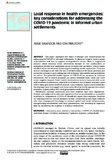| dc.contributor.author | Wilkinson, Annie | |
| dc.date.accessioned | 2020-10-27T13:00:24Z | |
| dc.date.available | 2020-10-27T13:00:24Z | |
| dc.date.issued | 2020-05-05 | |
| dc.identifier.citation | Wikinson, A. et al (2020) 'Local Response in Health Emergencies: Key Considerations for Addressing the COVID-19 Pandemic in Informal Urban Settlements,' Environment & Urbanization (IIED), May 2020 | en |
| dc.identifier.uri | https://opendocs.ids.ac.uk/opendocs/handle/20.500.12413/15735 | |
| dc.description.abstract | This paper highlights the major challenges and considerations for
addressing COVID-19 in informal settlements. It discusses what is known about
vulnerabilities and how to support local protective action. There is heightened
concern about informal urban settlements because of the combination of
population density and inadequate access to water and sanitation, which makes
standard advice about social distancing and washing hands implausible. There are
further challenges to do with the lack of reliable data and the social, political and
economic contexts in each setting that will influence vulnerability and possibilities
for action. The potential health impacts of COVID-19 are immense in informal
settlements, but if control measures are poorly executed these could also have
severe negative impacts. Public health interventions must be balanced with social
and economic interventions, especially in relation to the informal economy upon
which many poor urban residents depend. Local residents, leaders and communitybased
groups must be engaged and resourced to develop locally appropriate control
strategies, in partnership with local governments and authorities.
Historically, informal settlements and their residents have been stigmatized,
blamed, and subjected to rules and regulations that are unaffordable or unfeasible
to adhere to. Responses to COVID-19 should not repeat these mistakes. Priorities
for enabling effective control measures include: collaborating with local residents
who have unsurpassed knowledge of relevant spatial and social infrastructures,
strengthening coordination with local governments, and investing in improved
data for monitoring the response in informal settlements. | en |
| dc.language.iso | en | en |
| dc.publisher | Sage Journals | en |
| dc.rights.uri | http://creativecommons.org/licenses/by/4.0/ | en |
| dc.subject | Health | en |
| dc.title | Local Response in Health Emergencies: Key Considerations for Addressing the COVID-19 Pandemic in Informal Urban Settlements | en |
| dc.type | Other | en |
| dc.rights.holder | © 2020 International Institute for Environment and Development (IIED) | en |
| dc.identifier.externaluri | https://journals.sagepub.com/doi/full/10.1177/0956247820922843 | en |
| dc.identifier.doi | https://doi.org/10.1177/0956247820922843 | |
| rioxxterms.funder | Default funder | en |
| rioxxterms.identifier.project | Default project | en |
| rioxxterms.version | NA | en |
| rioxxterms.versionofrecord | 10.1177/0956247820922843 | en |
| rioxxterms.funder.project | 9ce4e4dc-26e9-4d78-96e9-15e4dcac0642 | en |


